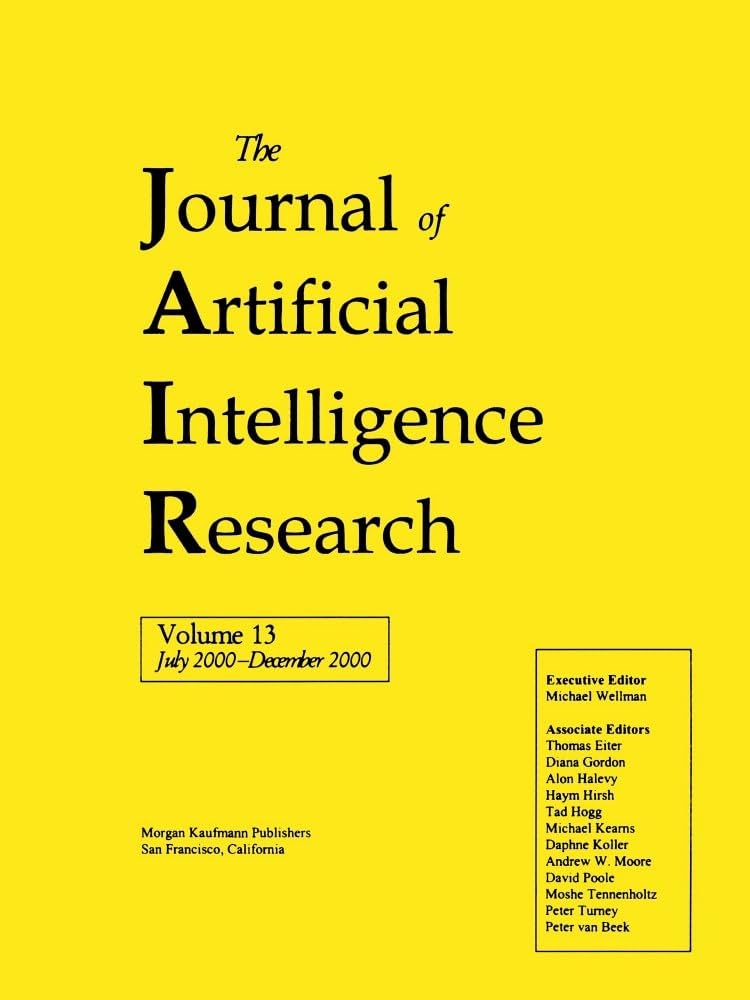Communication-Aware Local Search for Distributed Constraint Optimization
IF 4.5
3区 计算机科学
Q2 COMPUTER SCIENCE, ARTIFICIAL INTELLIGENCE
引用次数: 1
Abstract
Most studies investigating models and algorithms for distributed constraint optimization problems (DCOPs) assume that messages arrive instantaneously and are never lost. Specifically, distributed local search DCOP algorithms, have been designed as synchronous algorithms (i.e., they perform in synchronous iterations in which each agent exchanges messages with all its neighbors), despite running in asynchronous environments. This is true also for an anytime mechanism that reports the best solution explored during the run of synchronous distributed local search algorithms. Thus, when the assumption of perfect communication is relaxed, the properties that were established for the state-of-the-art local search algorithms and the anytime mechanism may not necessarily apply. In this work, we address this limitation by: (1) Proposing a Communication-Aware DCOP model (CA-DCOP) that can represent scenarios with different communication disturbances; (2) Investigating the performance of existing local search DCOP algorithms, specifically Distributed Stochastic Algorithm (DSA) and Maximum Gain Messages (MGM), in the presence of message latency and message loss; (3) Proposing a latency-aware monotonic distributed local search DCOP algorithm; and (4) Proposing an asynchronous anytime framework for reporting the best solution explored by non-monotonic asynchronous local search DCOP algorithms. Our empirical results demonstrate that imperfect communication has a positive effect on distributed local search algorithms due to increased exploration. Furthermore, the asynchronous anytime framework we proposed allows one to benefit from algorithms with inherent explorative heuristics.基于通信感知的分布式约束优化局部搜索
大多数研究分布式约束优化问题(dcop)的模型和算法的研究都假设消息是即时到达并且永远不会丢失的。具体来说,分布式本地搜索DCOP算法被设计为同步算法(即,它们在同步迭代中执行,其中每个代理与所有邻居交换消息),尽管运行在异步环境中。对于报告同步分布式本地搜索算法运行期间探索的最佳解决方案的任何时间机制也是如此。因此,当完美通信的假设被放宽时,为最先进的本地搜索算法和随时机制建立的属性可能不一定适用。在这项工作中,我们通过以下方式解决了这一限制:(1)提出了一个通信感知DCOP模型(CA-DCOP),该模型可以表示具有不同通信干扰的场景;(2)研究了现有的局部搜索DCOP算法,特别是分布式随机算法(DSA)和最大增益消息(MGM)在消息延迟和消息丢失情况下的性能;(3)提出了一种感知延迟的单调分布式局部搜索DCOP算法;(4)提出一种异步随时报告框架,用于报告非单调异步局部搜索DCOP算法探索的最优解。我们的实证结果表明,由于探索的增加,不完善的通信对分布式局部搜索算法有积极的影响。此外,我们提出的异步随时框架允许人们从具有固有探索性启发式的算法中受益。
本文章由计算机程序翻译,如有差异,请以英文原文为准。
求助全文
约1分钟内获得全文
求助全文
来源期刊

Journal of Artificial Intelligence Research
工程技术-计算机:人工智能
CiteScore
9.60
自引率
4.00%
发文量
98
审稿时长
4 months
期刊介绍:
JAIR(ISSN 1076 - 9757) covers all areas of artificial intelligence (AI), publishing refereed research articles, survey articles, and technical notes. Established in 1993 as one of the first electronic scientific journals, JAIR is indexed by INSPEC, Science Citation Index, and MathSciNet. JAIR reviews papers within approximately three months of submission and publishes accepted articles on the internet immediately upon receiving the final versions. JAIR articles are published for free distribution on the internet by the AI Access Foundation, and for purchase in bound volumes by AAAI Press.
 求助内容:
求助内容: 应助结果提醒方式:
应助结果提醒方式:


